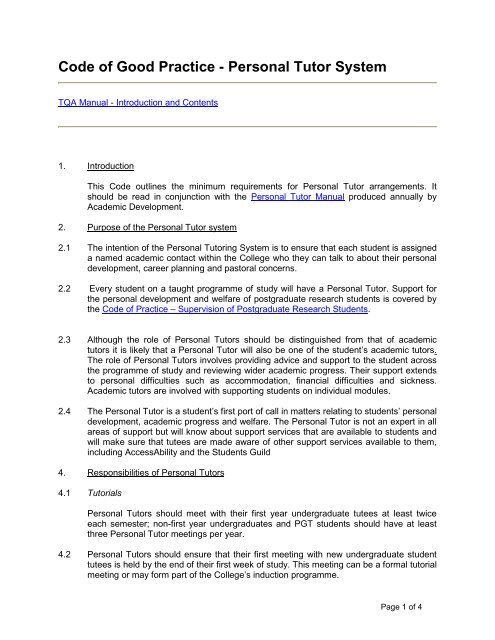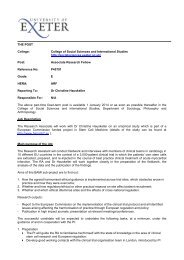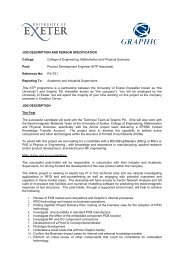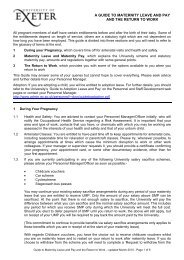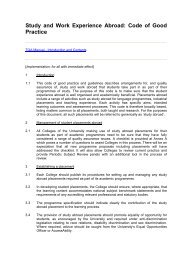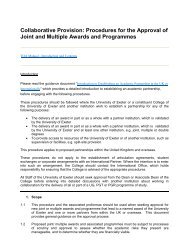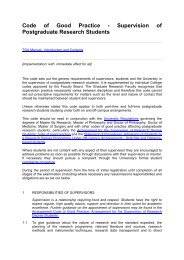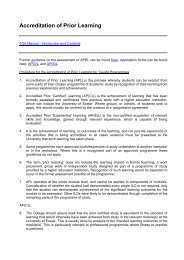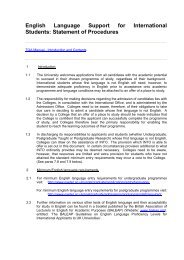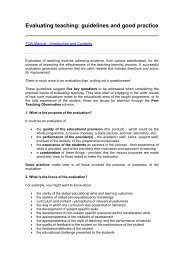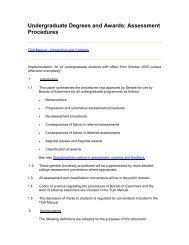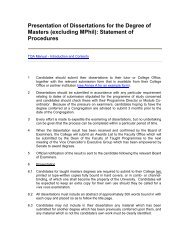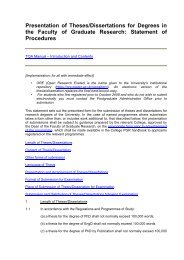Personal Tutor System - University of Exeter
Personal Tutor System - University of Exeter
Personal Tutor System - University of Exeter
You also want an ePaper? Increase the reach of your titles
YUMPU automatically turns print PDFs into web optimized ePapers that Google loves.
Code <strong>of</strong> Good Practice - <strong>Personal</strong> <strong>Tutor</strong> <strong>System</strong><br />
TQA Manual - Introduction and Contents<br />
1. Introduction<br />
This Code outlines the minimum requirements for <strong>Personal</strong> <strong>Tutor</strong> arrangements. It<br />
should be read in conjunction with the <strong>Personal</strong> <strong>Tutor</strong> Manual produced annually by<br />
Academic Development.<br />
2. Purpose <strong>of</strong> the <strong>Personal</strong> <strong>Tutor</strong> system<br />
2.1 The intention <strong>of</strong> the <strong>Personal</strong> <strong>Tutor</strong>ing <strong>System</strong> is to ensure that each student is assigned<br />
a named academic contact within the College who they can talk to about their personal<br />
development, career planning and pastoral concerns.<br />
2.2 Every student on a taught programme <strong>of</strong> study will have a <strong>Personal</strong> <strong>Tutor</strong>. Support for<br />
the personal development and welfare <strong>of</strong> postgraduate research students is covered by<br />
the Code <strong>of</strong> Practice – Supervision <strong>of</strong> Postgraduate Research Students.<br />
2.3 Although the role <strong>of</strong> <strong>Personal</strong> <strong>Tutor</strong>s should be distinguished from that <strong>of</strong> academic<br />
tutors it is likely that a <strong>Personal</strong> <strong>Tutor</strong> will also be one <strong>of</strong> the student’s academic tutors.<br />
The role <strong>of</strong> <strong>Personal</strong> <strong>Tutor</strong>s involves providing advice and support to the student across<br />
the programme <strong>of</strong> study and reviewing wider academic progress. Their support extends<br />
to personal difficulties such as accommodation, financial difficulties and sickness.<br />
Academic tutors are involved with supporting students on individual modules.<br />
2.4 The <strong>Personal</strong> <strong>Tutor</strong> is a student’s first port <strong>of</strong> call in matters relating to students’ personal<br />
development, academic progress and welfare. The <strong>Personal</strong> <strong>Tutor</strong> is not an expert in all<br />
areas <strong>of</strong> support but will know about support services that are available to students and<br />
will make sure that tutees are made aware <strong>of</strong> other support services available to them,<br />
including AccessAbility and the Students Guild<br />
4. Responsibilities <strong>of</strong> <strong>Personal</strong> <strong>Tutor</strong>s<br />
4.1 <strong>Tutor</strong>ials<br />
<strong>Personal</strong> <strong>Tutor</strong>s should meet with their first year undergraduate tutees at least twice<br />
each semester; non-first year undergraduates and PGT students should have at least<br />
three <strong>Personal</strong> <strong>Tutor</strong> meetings per year.<br />
4.2 <strong>Personal</strong> <strong>Tutor</strong>s should ensure that their first meeting with new undergraduate student<br />
tutees is held by the end <strong>of</strong> their first week <strong>of</strong> study. This meeting can be a formal tutorial<br />
meeting or may form part <strong>of</strong> the College’s induction programme.<br />
Page 1 <strong>of</strong> 4
4.3 <strong>Tutor</strong>ial meetings may be held in group tutorials where this is appropriate to the purpose<br />
<strong>of</strong> the tutorial.<br />
4.4 <strong>Personal</strong> <strong>Tutor</strong>s should also set aside designated time each week during term-time to be<br />
available to see personal tutees without prior appointment. These arrangements should<br />
be communicated to students in an appropriate manner. <strong>Personal</strong> <strong>Tutor</strong>ial hours are not<br />
intended to be in addition to <strong>of</strong>fice hours but to more clearly indicate the times that tutors<br />
are available to students for <strong>Personal</strong> <strong>Tutor</strong> meetings.<br />
4.5 <strong>Personal</strong> <strong>Tutor</strong>s are responsible for calling a tutorial meeting where there are reports <strong>of</strong><br />
unsatisfactory attendance or performance from module conveners or in the event <strong>of</strong> any<br />
other cause for concern.<br />
4.6 <strong>Personal</strong> <strong>Tutor</strong>s should inform students by email <strong>of</strong> the purpose <strong>of</strong> any tutorials and <strong>of</strong><br />
any preparations that the student should complete in advance <strong>of</strong> a tutorial. <strong>Tutor</strong>ials<br />
should be scheduled at appropriate times during the year to review progress and to<br />
provide advice and guidance as necessary.<br />
4.7 A record should be kept <strong>of</strong> each meeting and any follow-up actions agreed<br />
4.8 <strong>Personal</strong> <strong>Tutor</strong>s will be familiar with the <strong>University</strong>’s guidance on confidentiality. Where a<br />
student raises matters in confidence, this confidence must be respected, unless there is<br />
a risk <strong>of</strong> harm to the student or others. The student should be strongly advised to seek<br />
any further support as appropriate.<br />
5. Responsibilities <strong>of</strong> students<br />
5.1 Students are regarded as active partners in their learning and development at the<br />
<strong>University</strong>, and a degree <strong>of</strong> pr<strong>of</strong>essionalism is expected from them. It is therefore<br />
expected that students will attend all scheduled meetings requested by <strong>Personal</strong> <strong>Tutor</strong>s,<br />
or agree an alternative time as convenient. Students should be prepared for tutorial<br />
discussions and respond to requests for information as required by the College.<br />
5.2 Students are also encouraged to be proactive in identifying and accessing any relevant<br />
skills training <strong>of</strong>fered by the College or the <strong>University</strong>, as appropriate and to take note <strong>of</strong>,<br />
and respond to, feedback and guidance from <strong>Personal</strong> <strong>Tutor</strong>s.<br />
5.3 Where a student’s personal or other circumstances are impacting on their academic<br />
progress it is expected that they will inform their <strong>Personal</strong> <strong>Tutor</strong>, and discuss ways to<br />
resolve such circumstances. .<br />
5.4 Students should inform the <strong>University</strong> Registry <strong>of</strong> any changes in address or similar<br />
personal details by logging into My<strong>Exeter</strong> and clicking the student record tab to amend<br />
contact details.<br />
5.5 Students should check their <strong>University</strong> email at least once per day for messages from<br />
the <strong>Personal</strong> <strong>Tutor</strong> and other members <strong>of</strong> staff.<br />
Page 2 <strong>of</strong> 4
6. Responsibilities <strong>of</strong> the College or Partner Institution<br />
6.1 The College (or Partner Institution) should make available to students and staff clear<br />
information concerning the provision <strong>of</strong> personal tutoring and support for students’<br />
personal development within the College.<br />
6.2 The College should be mindful <strong>of</strong> the <strong>University</strong>’s Diversity and Equality Policy when<br />
allocating <strong>Personal</strong> <strong>Tutor</strong>s and considering any requests from students to change their<br />
<strong>Personal</strong> <strong>Tutor</strong>s. http://www.exeter.ac.uk/staff/equality<br />
6.3 It is recognised that staff other than academic staff, such as secretaries and technicians,<br />
<strong>of</strong>ten provide a listening ear for students outside the tutorial framework. It is therefore<br />
important that Colleges/partners ensure that they, too, are aware <strong>of</strong> this Code.<br />
6.4 The College should factor in personal tutoring duties when considering workload models.<br />
7. Senior <strong>Tutor</strong><br />
7.1 Each College should have at least one Senior <strong>Tutor</strong> or equivalent key contact, who can<br />
provide guidance, support and resources to other <strong>Personal</strong> <strong>Tutor</strong>s in the College<br />
including, where appropriate, schedules, suggested agendas and checklists to maximise<br />
consistency in the student experience <strong>of</strong> personal tutoring in a College.<br />
7.2 The Senior <strong>Tutor</strong> should be able to signpost <strong>Personal</strong> <strong>Tutor</strong>s to additional sources <strong>of</strong><br />
support, guidance and training and assist, as appropriate, in the management <strong>of</strong> more<br />
complex cases such as those involving disciplinary and Fitness to Study procedures.<br />
7.2 Senior <strong>Tutor</strong>s are expected to liaise and share practice with colleagues in similar roles<br />
across the <strong>University</strong> through participation in the Senior <strong>Tutor</strong> Forum, facilitated by a<br />
central coordinator in Academic Development. Senior <strong>Tutor</strong>s are also expected to work<br />
with SSLCs and to provide updates on personal tutoring to College Education Strategy<br />
Meetings.<br />
8. Allocation <strong>of</strong> <strong>Personal</strong> <strong>Tutor</strong>s<br />
8.1 Colleges are responsible for allocating a <strong>Personal</strong> <strong>Tutor</strong> to all taught students and<br />
recording these in the student record system.<br />
8.2 Colleges should also provide clear, transparent information to students on how to<br />
change their <strong>Personal</strong> <strong>Tutor</strong>, without the need for students to give a reason for their<br />
request.<br />
8.3 Unless there is a specific need to provide two <strong>Personal</strong> <strong>Tutor</strong>s, Combined Honours<br />
students, and FCH students, should be allocated only one <strong>Personal</strong> <strong>Tutor</strong>. However,<br />
there should also be a named contact in the other College where this applies, to provide<br />
specialist guidance in relation to module choice and any other issues arising that are<br />
related to the other College. In the case <strong>of</strong> such students, <strong>Personal</strong> <strong>Tutor</strong>s may need to<br />
liaise with the named contact in the tutee’s other College from time to time.<br />
Page 3 <strong>of</strong> 4
9. Support for <strong>Personal</strong> <strong>Tutor</strong>s<br />
9.1 Colleges must ensure that staff allocated to undertake personal tutoring are properly<br />
trained (including disability awareness training), fully briefed and aware <strong>of</strong> the relevant<br />
learning and development opportunities available to them as <strong>Personal</strong> <strong>Tutor</strong>s, and that<br />
all tutors are provided with access to the <strong>University</strong>’s <strong>Personal</strong> <strong>Tutor</strong> Manual and<br />
resources on the <strong>University</strong> website.<br />
9.2 Colleges must ensure that <strong>Personal</strong> <strong>Tutor</strong>s and students are aware <strong>of</strong> the <strong>University</strong>’s<br />
Health Well Being and Fitness to Study policy<br />
http://www.exeter.ac.uk/staff/policies/calendar/part1/otherregs/health/ and to the<br />
Mitigation Policy<br />
9.2 Colleges must also provide <strong>Personal</strong> <strong>Tutor</strong>s with basic information about their tutees at<br />
the outset <strong>of</strong> the programme and ensure that <strong>Personal</strong> <strong>Tutor</strong>s have access to, or receive<br />
information about their tutees’ academic progress.<br />
9.3 <strong>Personal</strong> <strong>Tutor</strong>s should be prepared to write a reference for the tutee unless alternative<br />
provision is made by a College employability <strong>of</strong>ficer or other individual who knows the<br />
tutee.<br />
10. Monitoring and enhancement<br />
10.1 Colleges should monitor students’ attendance at scheduled personal tutorials and have<br />
in place standard procedures for following up students who fail to attend such prearranged<br />
meetings.<br />
10.2 Colleges should also monitor personal tutoring through reviewing the results <strong>of</strong><br />
<strong>University</strong> surveys, as well as through other College monitoring and evaluation<br />
processes, as appropriate. <strong>Personal</strong> tutoring should be a standing item on the agenda<br />
for SSLCs.<br />
10.3 At <strong>University</strong> level, the effectiveness <strong>of</strong> personal tutoring provision in Colleges will be<br />
monitored through quality processes such as the Annual Student Experience Review<br />
and inclusion <strong>of</strong> questions relating to <strong>Personal</strong> <strong>Tutor</strong> support in <strong>University</strong> surveys.<br />
10.4 The Senior <strong>Tutor</strong> Forum will produce a yearly commentary to Taught Faculty Board,<br />
identifying progress and issues regarding the personal tutoring system. The<br />
commentary may also refer to the appropriateness <strong>of</strong> structures; roles and<br />
responsibilities; allocation <strong>of</strong> tutors to tutees; workload; attendance monitoring, student<br />
feedback, observations regarding general trends and examples <strong>of</strong> good practice.<br />
Last reviewed September 2013<br />
Top<br />
Page 4 <strong>of</strong> 4


